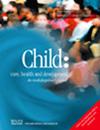Harsh Parenting, Maternal Depression, and Executive Function in Early Childhood
Abstract
Background
Executive function (EF), a multimodal construct that captures one's control over cognition and behaviour, is associated with academic achievement and social–emotional competence. Prior research suggests that early childhood experiences and the family context shape EF development. Harsh parenting practices—defined through verbal and psychological aggression—and maternal depression are identified as factors that may inhibit early EF development. We examined the relation between these two parenting factors at child age 30 months and two fundamental EF skills, attention and inhibitory control (IC), measured at 42 months.
Methods
We used a combination of parent self-report (Center for Epidemiological Studies Depression, Childhood Behaviour Questionnaire) and independent observational data (Home Observational Measurement of the Environment) from a random, representative sample of 549 births in Durham County, North Carolina. Linear regression models estimated the effects of harsh parenting and maternal depression on later child EF outcomes, while accounting for child and family characteristics.
Results
Harsh parenting behaviours at 30 months predicted lower child IC skills (b = −0.46, p = 0.041) and lower attention skills (b = −0.64, p = 0.007) at 42 months. Greater maternal depression symptoms at 30 months predicted lower IC skills (b = −0.14, p = 0.017) and lower attention skills (b = −0.21, p = 0.001) at 42 months.
Conclusions
Results highlight the importance of parenting behaviours and parental mental health in shaping early EF. Although correlational in design, this work may inform future early childhood interventions aimed at altering parental behaviour and mental health to promote childhood EF.


 求助内容:
求助内容: 应助结果提醒方式:
应助结果提醒方式:


